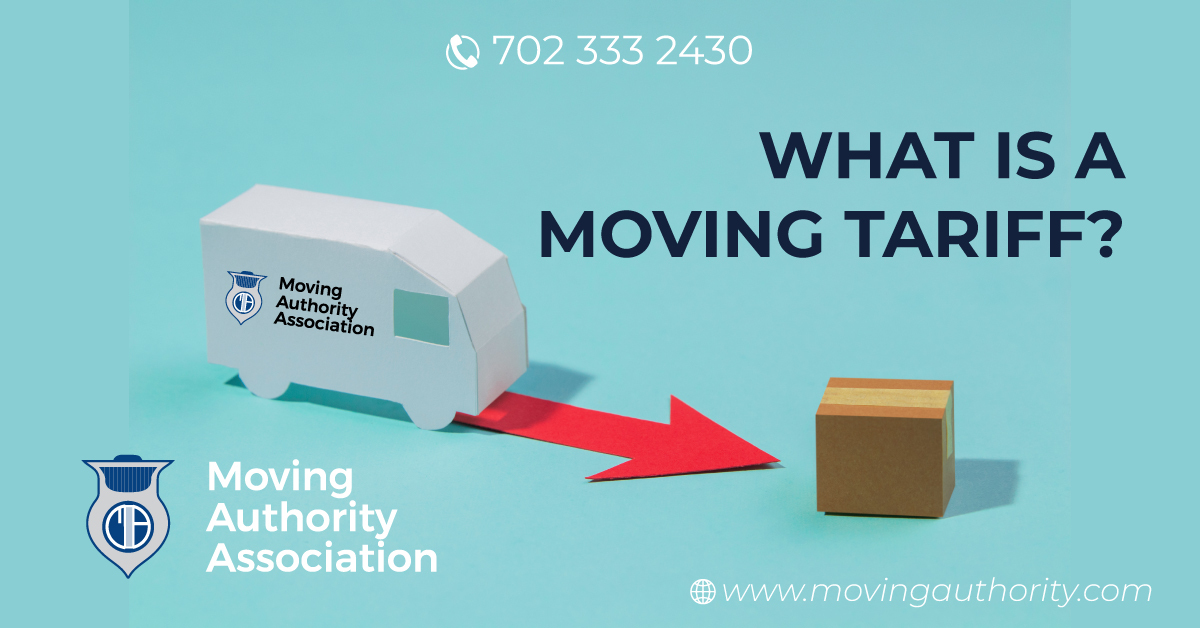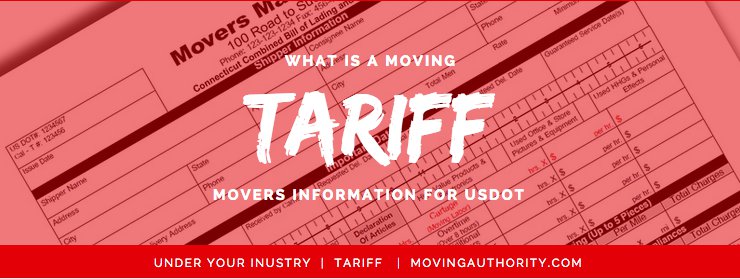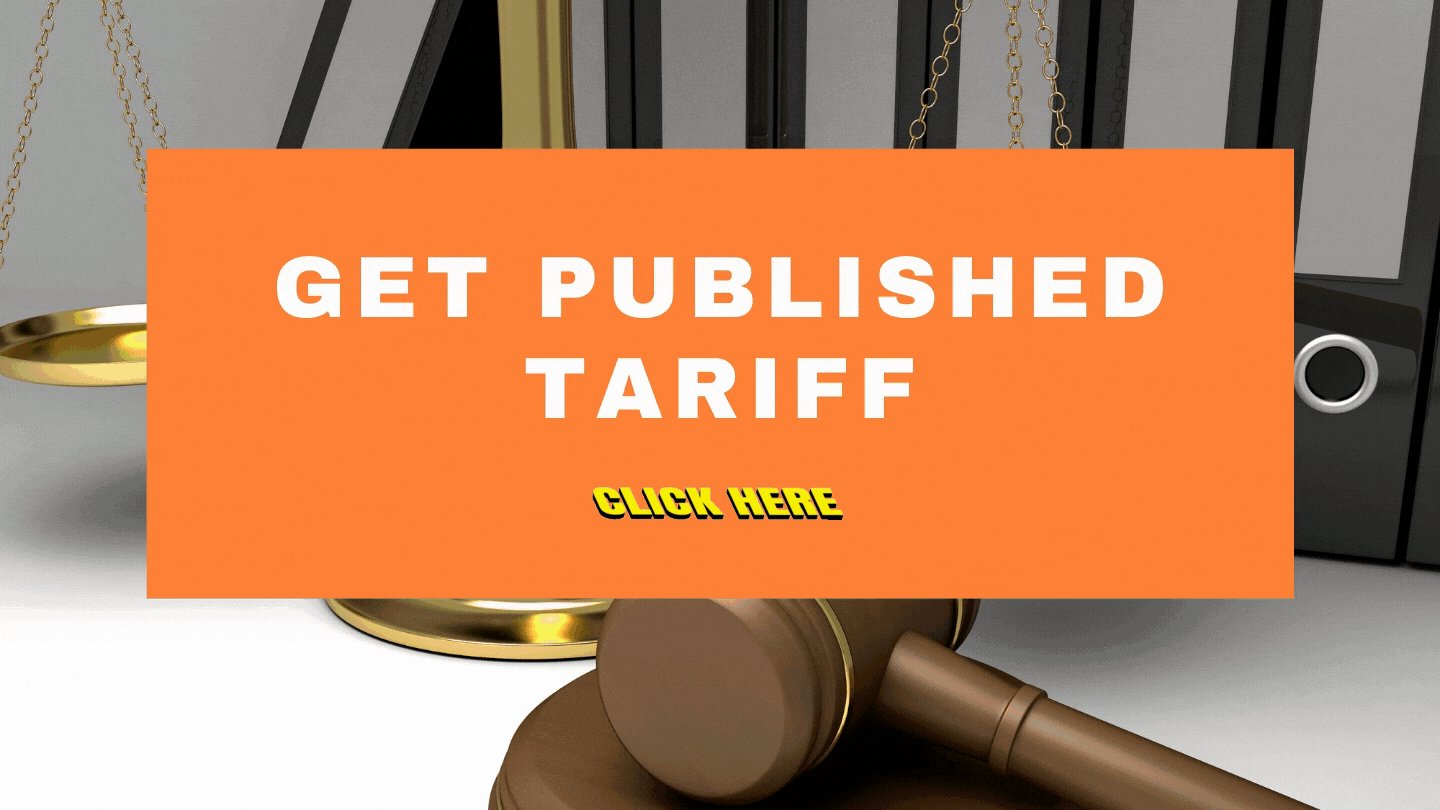What is a Moving Tariff?

A Moving Tariff: What You Need to Know

- What is a Tariff?
- Informative Videos On Moving Tariffs (Videos)
- How is a Moving Tariff Constructed
- Online Moving Tariffs
- What is a Moving Tariff? (Video)
- Moving Tariffs for Movers
- What if I Discount a Move?
- Is My Company Required to Own A Moving Tariff (Video)
- What are the Penalties for Tariff Violations?
- The Value of Having a Moving Tariff for Your Moving Company
- Moving Season is Upon Us: Be Compliant!
- Moving Forms: What Do I Need?
1. What is a Tariff?
2. Informative Videos On Moving Tariffs
Moving companies moving tariff must be in printed form and ready for inspection. The tariff lists all company policies and a copy of the “bill of lading” and “Order for service.” Any other paperwork used during the transportation of household goods is also included.
3. How is a Moving Tariff Constructed?
We recommend building your tariff with the owner of the moving company. This way, you align services, fees, and organizations' operations with a business model. Also, your tariff will be up to date with all new laws that apply, such as the new STB laws. The DOT always changes or updates its laws, and in turn, carriers must update their tariff. Don’t think that the statement “I didn’t know” will work when you have an inspection by the DOT. If the moving company has an up to date tariff and the knowledge of how to use it, you should be fine. It's surprising how many times movers say they don’t understand their own tariff. Knowledge is power, so it's our goal to help you know more about tariffs.
4. Online Moving Tariffs
WARNING: Online moving tariffs are becoming available, but don't usually match the company policies. It eats up a lot of time to match the company pricing with moving software pricing. If you have moving software that comes with built-in pricing, it cannot serve as an actual tariff. It's crucial that you must officially publish your moving tariff. Unfortunately, some people in the moving industry will tell you what you want to hear only to make money.
Let me tell you: when I first started in the moving industry, this is what happened to me. I listened to the person who sold me my moving tariff and forms, and I followed all their instructions. Once I had an inspection I found out that many of the things that she pointed out to me were not true at all. She was teaching me incorrect practices. You can do one of two things. You can spend years in the industry pulling your hair out, or you can use the expert tools from Moving Authority. Doing business the right way will help you, trust me.
5. What Is A Tariff? (Video)
6. Moving Tariffs for Movers
Having a correct moving tariff is the law, so don't fall into the trap of doing business the wrong way!
We have built tariffs to safeguard your business and empower your employees. In turn, this allows you to become successful within the moving industry. We have covered some vital key points to protect you and your actions while doing business. Government laws state that a tariff must include the prices, taxes, and terms of your services.
The interstate moving tariff is our most popular tariff. This allows you to calculate pricing based on the information below. Interstate tariffs differ from others, because of the costs of long distance moving. Be sure to review your long-distance moving tariff before conducting business.
Some items that should be in Tariff
- State to state moving costs. Per pound or Per Cubic Foot
- Price of shuttle moving services
- Location charges
- Calculator how accessorial fees
- Price of the packing materials
- Additional stops
- Delivery time schedules
- The price of a hoist
- The price of bulk articles
We are the leaders on up-to-date moving tariffs and related paperwork. Because of this, movers who choose to use us can move their customers with expertise. We believe in helping the moving industry so that it can thrive. Due to this, we can keep the American moving industry strong.
7. What if I Discount a Move?
The answer is YOU CAN'T randomly discount a move.
A lot of movers don't know this one but, by law, you must charge your matching tariff rates or other service rates. It is actually against the law to charge less or ask for a good rating in return for services. Trading is also not allowed when you have a tariff for moving. You can change tariff rates or prices as long as you document the paperwork and related forms in the tariff. If you do this, then it should match your tariff. Make sure everything is fully documented on the paperwork and moving contracts.
The reason for this rule is to protect the consumer. Moving companies can't adjust their prices at the drop of a hat based on what their competitors offer.
This is one of the reasons why a tariff should have prices that either matches the market price or fall in a close range. Placing prices below market price may get you more customers, but you will be making less per job. Placing prices above market prices may get you fewer customers, but you will be making more per job. It all depends on your professional goal. If you are aiming to increase the flow of incoming customers, a lower price may attract them. If a business is booming, increasing your price may prove beneficial.
8. Is My Company Required To Own A Moving Tariff? (Video)
9. What are the Penalties for Tariff Violations?
Here is the scary part. Penalties for tariff provision violations can come about in one of two ways. Either a company will overcharge for its services, or it will undercharge. An entity that charges fees not matching the rate in their tariff will be on the hook for a civil infraction. But that's not all: there's also a resulting penalty of up to $100,000.00 for each individual violation. The U.S government has criminal penalties for tariff violations. Each violation can include a fine or even a prison sentence for up to two years. Now you understand the importance of a tariff, and how the lack of one can incriminate a mover. Some companies might trick the customer into thinking that they have a discount. In actuality, they are being charged MORE with hidden fees. The CPUC and USDOT use utility enforcement to find rogue movers to find and close down. These organizations encourage reporting complaints of any mover with licensing issues.
10. The Value of Having a Moving Tariff for Your Moving Company
A moving and storage tariff provides lots of value to a moving company. By having set prices, a company is able to keep track of what it sells to customers. Failing to have a tariff sets your moving company up for failure in the long run. The DOT will find out about it and impose large fines on you. The bottom line: acquiring a tariff as soon as possible will make your company more efficient. Also, you'll be more protected when it comes to competing in the moving industry.
In the end, it's important to remember that all moving companies must operate with a moving tariff. Operating without a tariff is against the law, and will result in grave consequences. As for the customer, the tariff is helpful as an outline of all pricing and protocols.
For some states it is mandatory to implement tariffs according to their laws. Therefore if your company operates within Georgia, New York, and New Jersey, do not hesitate to contact us. We have professionals on site to help you.
Moving Season & Need My License

11. Moving Season is Upon Us
The summer moving season is about to heat up in the next few weeks. For all the moving companies out there, this means a boom in business from May-September. On average, 1.6 million Americans uproot their homes and move state to state during the summer months. This makes the nation look like a giant game of musical chairs. Moving Authority offers services for moving companies like custom tariffs and arbitration. With us on your side, you and your company can have one less thing to worry about.
12. Moving Forms: What Do I Need?
- Moving Form: This is a bill of landing that comes with all moving companies. This paperwork should go through what items are being moved and to where.
Tariffs: A moving tariff is, in essence, a menu of services that a particular moving company offers. It will outline all their services and what they charge for each thing. This is a legally binding document. Make sure the company charges you exactly what it states in their tariff. Any reputable moving company will be doing this already.
Inventory Checklist (High-Value Inventory): The inventory checklist should outline all high-value household inventory or extraordinary items. This would include things like pianos, rare artifacts or paintings, expensive electronics, etc.
Arbitration: All moving companies need to have an arbitration service in place. They must present customers with an arbitration information packet before the move begins. Arbitration is the use of a neutral third party that the movers or the customer can use to settle any disputes. It is legally required for moving companies to have arbitration. The arbitrator keeps either party out of having to go to small claims court in the event of a dispute.
Moving is stressful, and there are so many aspects to consider. Before a move, during the move, and after it's over, one must pay attention to detail. Make sure you and the company you choose to have all the compliant paperwork! Don’t just get moving, get moving right!
How Tariffs Have Evolved Over the Years
Tariffs have always been explained as a menu of sorts. They are price lists that are set by moving companies for the services and goods that they offer. Movers are required to file tariffs with the USDOT to ensure that movers across the industry are operating to the same standard.
Before 2008, tariffs were mandated by the industry. This means that every company operated under the same tariff. If you were to call in search of a quote for a long distance move, then you would get the same price from each and every company that you reached out to.
In trying to make the moving industry more competitive, the government lightened mandates on tariffs, meaning that companies could discount them. Soon after this, government mandates were lifted completely. At this point, moving companies were required to file their own tariffs.
The concept of a tariff is still a little foreign to companies that are just coming into the industry. There are several complexities to developing an effective and inclusive tariff form. General Tariffs increase the price of imported goods, making domestic goods cheaper in comparison.
Estimates for moves completed by a company vary based on the rates outlined in the tariff. Local moves are generally estimated by the number of men that are necessary to complete a job. Long-distance moving is charged based on how much the shipment weighs.
For moves of either type, if you are not sure what exactly you will be moving, the company can use their tariff to give you an estimated price. Make sure that you get any quotes in writing. For moves that take place in-state, ensure that you ask the company about rules and regulations regarding pricing discounts, as they are not allowed in every state.)
Tariffs have changed a lot since they were introduced to the moving industry. However, their basic function remains the same. You can request to see a company’s tariff at any time to make sure you are getting the best rates.

Comments
Charlotte McKenzie
Feb. 23, 2022, 12:38 a.m.
Good Day, We have a few clients that come to us with quote from other Companies. What is the procedure for us to make sure we are competitive with the other prices, but it comes in under our tariff?
Jackson Gait
Feb. 23, 2022, 12:38 a.m.
Thanks for the information about tariffs. I was failing to understand what they were and why i needed one. I'm glad I came here to find out more about it. I didn't even realize they were required for moving. I have mainly been doing local moves so there wasn't ever a need for one but once I decided to become a long distance mover, the word tariff kept on being mentioned and I tried to see what it was about. At the moment, I'm researching the market for moving tariff prices and I find that you offer very competitive prices for your tariff. The problem with researching tariffs is the quality of service I would be getting for the tariff. I'm sure what you offer is of good value but I'm still worried that I might not get what I was looking for in the purchase of the tariff. I guess I'll continue to ask more companies about what they provide when someone purchases their tariff. Thanks!
Courtney Apstein
Feb. 23, 2022, 12:38 a.m.
My husband is starting a moving company and needs all of the proper paperwork to be compliant. So I've been researching all over about tariffs, what they are, what you can do with them such as pricing and our services etc. This article really cleared up a lot of the questions I had about building a moving tariff. After I became aware of how serious it is in this industry, especially if you're just starting up like us, to have all of the paperwork when you are a long distance household goods carrier. A big plus about this article is that it gives you exactly what you need instead of other places I've researched where they were really hard for me to understand. Good news is that my husband and I were able to call up and make an appointment with a professional tariff builder right away with (and then we found out that we could even make it a customs tariff). We're a little past the beginning of the season but our tariff builder took care of it in like 45 minutes. They just ask you questions about what services you want on there and for how much that's all I can really remember. Some more good news was that they have an arbitration program too for a super low annual cost!! We purchased that through Moving Authority too because it was all really convenient. So now were all covered just waiting for our Arbitration Certificate to come in the mail. Thanks for all your resources and for making these overwhelming and confusing rules and regulations simplified. And also for posting links to the correct paperwork. Seriously so helpful!!
Fred V.
Feb. 23, 2022, 12:38 a.m.
Thanks for the information on moving tariff. So that I understand clearly, it basically is a menu, correct? But it includes the correct verbiage and FMCSA requirements, correct? This is the first time that I have opened a moving company and your website has informed and educated me. Thank you.
Add Comment